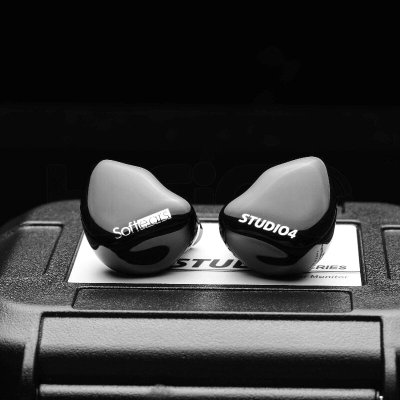Softears Studio 4 and Nicehck Rockies use 4BA and 1DD+2BA+2EST driver setups respectively. Softears Studio 4 costs $450 while Nicehck Rockies costs $499. Nicehck Rockies is $49 more expensive. Nicehck Rockies holds a decisive 1.4-point edge in reviewer scores (8 vs 9.4). Nicehck Rockies carries a user score of 9. Nicehck Rockies has significantly better mids with a 1-point edge, Nicehck Rockies has significantly better treble with a 2-point edge, Nicehck Rockies has significantly better dynamics with a 2-point edge and Nicehck Rockies has better soundstage with a 0.5-point edge.
Insights
| Metric | Softears Studio 4 | Nicehck Rockies |
|---|---|---|
| Mids | 8 | 9 |
| Treble | 7 | 9 |
| Soundstage | 8 | 8.5 |
| Dynamics | 5 | 7 |
| Tonality | 7 | 8.4 |
| Technicalities | 7 | 9 |
Jaytiss Reviews Comparison
Softears Studio 4 reviewed by
Youtube Video Summary
Starry Edition brings a fresh faceplate to the Softears Studio 4 without changing the tuning. The translucent, slightly large shell seals firmly and delivers strong isolation; the only nit is a modest nozzle lip that still holds tips fine. Packaging leans “studio”: compact Pelican-style case, extension cable, tips, 6.3 mm adapter, and a soft black cable that feels nice but lacks a chin slider and terminates in 3.5 mm.
Sonically, this 4BA set is about clarity, air, and top-end extension—described as among the best heard under $800. Vocals come through vivid, mids are clean, and bass has a mild shelf: tasteful impact without bloat, though it’s not a slam machine. Expect excellent imaging, space, and detail; a touch of EQ can add weight if desired. It can be a bit source-picky: low output impedance sources suit it best, while a 10 Ω adapter pushes more treble and trims bass in a less pleasing way.
Against peers, Studio 4 is praised over Softears Twilight for air/extension (while acknowledging Twilight’s smooth DD charm) and over Volume for overall technicalities despite the small price gap. Versus RSV, Studio 4 avoids the RSV’s slight bass “muffle” and undercuts it on price; compared with Monarch MKII, it delivers a similar tonal aim without the occasional grain. Sets like Kiwi Ears 4, Truthear Hexa, and Binary Acoustics D Quattro trade blows on bass quantity versus air, but Studio 4’s upper-air detail and coherence make it a standout. At an often-seen street of ~$368, it’s framed as a benchmark sub-$500 pick and earns a full recommendation for listeners chasing articulate treble, lifelike vocals, and refined balance.
Jaytiss Youtube Channel
Buy Softears Studio 4 on HiFiGO
Ad
Price: $449
Buy Softears Studio 4 on HiFiGO
Nicehck Rockies reviewed by
2025-09-03Youtube Video Summary
NiceHCK Rockies lands in the ~$500 bracket with a 1DD+2BA+2EST setup and a surprisingly premium package. The hollow resin shell feels solid, with a metal nozzle, slightly recessed 2-pin, good isolation, and comfy fit. The swappable-termination cable is thick, pliant, and lays flat—no chin slider out of the box, but easy to add—and the excellent case and tip kit push the accessories into “above class” territory.
Tonally, Rockies goes for tight, controlled bass and a natural midrange, capped by upper-treble that’s sparkly yet refined—detailed without getting shouty or brittle. The graph reads largely flat with a tasteful treble lift, translating to a clean, clear presentation that stays engaging rather than fatiguing. It comes across as an “instant classic” tuning: lively, airy, but still grounded.
Compared with brand siblings (DB2 too upper-midsy; F1 Pro/NX8 fine but not special), Rockies feels like the step up. Versus peers, it splits the difference: more air and delicacy than RSV MK2 (which is bassier/darker), less sizzle than sets that chase treble for effect, and broadly similar endgame vibes to “good” units of Mega5-EST—variance there being the rub. Net: a high-value pick at its price, worthy of a Gold Star—not a universal “benchmark,” but a sweet, natural, clear listen that many will prefer, especially with the standout accessories.
Jaytiss Youtube Channel
Softears Studio 4 Details
Driver Configuration: 4BA
Tuning Type: Neutral
Brand: Softears Top Softears IEMs
Price (Msrp): $450
Support our free service! Buying through our affiliate links costs you nothing extra:
Nicehck Rockies Details
Driver Configuration: 1DD+2BA+2EST
Tuning Type: Neutral with Bass Boost
Brand: NiceHCK Top NiceHCK IEMs
Price (Msrp): $499
Support our free service! Buying through our affiliate links costs you nothing extra:
Softears Studio 4 Scorings
Average Technical & Tuning Grades
Average Tunign Grade
A-- It balances warmth and clarity well, showing only minor quirks along the way. Timbre feels believable with most instruments.
Average Technical Grade
A-- The presentation feels orderly, balancing workable detail retrieval with acceptable imaging cues. It keeps momentum without smearing transients.
Nicehck Rockies Scorings
Average Technical & Tuning Grades
Average Tunign Grade
A+- You hear a mature integration of lows, mids, and highs that keeps music lifelike. Small tuning tweaks showcase expert restraint.
Average Technical Grade
S- It sounds masterful, combining swift transient response with panoramic spatial insight. Technical showpieces really shine here.
Softears Studio 4 User Reviews
"This is an example review"
Pros
- Example pro 1
- Example pro 2
Cons
- Example con 1
- Example con 2
Share your experience and build your personal ranking list.
You need to be signed in to write your own reviewNicehck Rockies User Reviews
Share your experience and build your personal ranking list.
You need to be signed in to write your own reviewA lively rendition of the diffuse field tuning that tilts slightly upward for additional clarity. Tastefully bass-boosted DD, clear and clean BA mids with slightly recessed vocals, and standout EST treble presence make an engaging JM-1 all-rounder.
Pros
Lively, unique take on neutral with bass boost. Excellent detail.Cons
An ever so slight increase in bass shelf could provide more dynamicism.Lively tribrid with engaging low end and airy detail that still sounds cohesive. Strong technical performance for the price without losing musicality.
Pros
Punchy, fast bass with good texture and sub-bass reach. Smooth-leaning EST treble with high detail and precise imaging; comfortable fit and solid isolation.Cons
V-shaped balance leaves mids a bit recessed. Treble can lean bright on poor recordings.Find your next IEM:
IEM Finder Quiz
newIEM Comparison Tool
newVS



